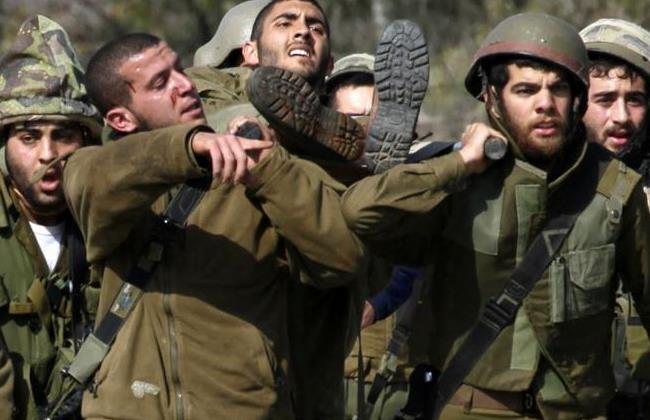
RNA - According to the Lebanese Daily Star, A U.N. Spanish peacekeeper was also killed in the heavy exchange of fire that followed the Hezbollah attack, as UNIFIL commander Maj. Gen. Luciano Portolano urged "maximum restraint" from all parties to prevent escalation on the Lebanese-Israeli frontier.
Media reports had earlier said that four Israeli soldiers were killed in the attack.
A security source told The Daily Star that 30 shells were fired from the Israeli side across the Lebanese border following the 11:30 a.m. attack that struck a convoy, destroying at least two vehicles. Hezbollah's Al-Manar TV said the attack destroyed 9 vehicles.
Hezbollah claimed the attack on the Israeli military convoy in a statement.
"At 11:25 [Wednesday morning] the Qunaitra Martyrs unit targeted with appropriate missile weapons an Israeli military convoy comprising several vehicles and [transporting] Zionist officers and soldiers causing the destruction of several vehicles and inflicting many casualties on the enemy," the brief statement read.
According to Israeli media, a number of Israeli Army troops were being treated with "light-to-moderate wounds" at a hospital in Safed.
About two hours after the initial attack, Israeli warplanes carried out mock air raids over the scene of the attack as their soldiers lobbed shells into Shebaa Farms and the surrounding hills.
U.N. Special Coordinator for Lebanon Sigrid Kaag called on all parties "to refrain from any actions that could destabilize the situation further."
"All parties are strongly urged to continue to abide by their obligations under Security Council resolution 1701," Kaag said of the resolution that put an end to the 2006 summer war between Lebanon and Israel.
In a letter to the U.N. Security Council, Israel said it reserved "its right to self-defense."
"Israel will not stand by as Hezbollah targets Israelis," Israel's U.N. Ambassador Ron Prosor said in a letter to the Security Council.
Israel's foreign minister said his country must respond "harshly and disproportionately."
A Lebanese Foreign Ministry statement said the country remained commited to Resolution 1701, arguing that Hezbollah’s attack did not amount to a violation of the 2006 deal since it targeted an Israeli military convoy inside the Shebaa Farms, which is occupied Lebanese territory.
“The Foreign Ministry reaffirms Lebanon’s commitment to Resolution 1701 for protecting itself from Israeli aggression,” the statement said.
Spain's president Mariano Rajoy Brey confirmed the death of a 36-year-old Spanish peacekeeper in Lebanon and said in a Twitter message that he sent his condolences to the soldier's family.
UNIFIL said it was investigating the cause of the peacekeeper's death.
"During the course of the developments, a UNIFIL peacekeeper deployed at a U.N. position near Ghajar sustained serious injuries that resulted in his death. The precise cause of death is as yet undetermined and remains the subject of investigation," the statement said.
It added that UNIFIL troops have boosted its presence in coordination with the Lebanese Army.
Earlier, UNIFIL spokesperson Andrea Tenenti said its force commander was in “close contact” with Lebanon and Israel and was “actively engaged with all the parties, urging restraint in order to prevent any escalation of the situation.”
No shelling was heard after calls for restraint came out around 2 p.m. However, Israeli warplanes still hovered overhead.
Schools in the area have been closed, and Syrian refugees relocated to a safer region in anticipation of an escalation.
In Beirut, celebratory gunfire could be heard in the afternoon.
Witnesses said Hezbollah responded to shelling of Lebanese territories from an Israeli position in the Ruweisat al-Alam area in the Shebaa Farms with projectiles in the early afternoon.
They said at least eight shells landed in the Israeli-occupied Shebaa Farms and several others crashed into nearby Majidieh, a town comprised primarily of agricultural land along the Wazzani River and opposite occupied Ghajar.
The incident came several hours after Israel launched an airstrike in Syria amid tensions that have escalated in the frontier area over the past 10 days.
According to Israeli daily Haaretz, the attacks took place as Israeli Prime Minister Benjamin Netanyahu was in the southern city of Sderot, laying the cornerstone for a new settlement. "At these moments, the IDF is responding to the events in the north. Look what happened here. Not far from the city of Sderot, in Gaza, Hamas was hit by the strongest blow it ever received last summer... Security comes before all else. Security is the foundation for everything," the report quoted Netanyahu as saying.
Netanyahu cut short short his visit to Sderot to travel to the Defense Ministry headquarters in Tel Aviv, Haaretz said. Israeli Defense Minister Moshe Ya'alon also convened a security briefing in the wake of the attack.
Israeli media reported that flights had been suspended at the airports in Rosh Pina and Haifa.
On Tuesday, at least two rockets from Syria hit the Israeli-occupied Golan Heights, and Israel responded with artillery fire.
The attack comes after an Israeli airstrike on a Hezbollah convoy near the Golan Heights on Jan. 18 that killed an Iranian Revolutionary Guard general along with six Hezbollah fighters, including the son of slain Hezbollah commander Imad Mughniyeh.
R111/108/C/